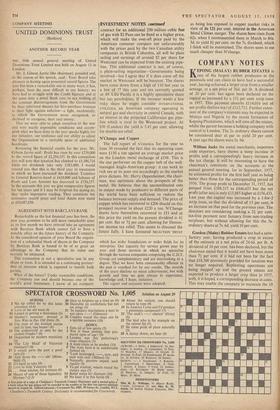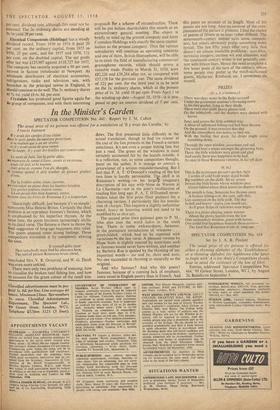COMPANY NOTES
KEPONG (MALAY) RUBBER ESTATES is one of the largest rubber producers in the peninsula and can claim to have had a successful year, having achieved a larger crop from a smaller acreage, at a net price of 26d. per lb. A dividend of 20 per cent. has again been declared on the capital as increased by a 334- per cent. scrip issue in 1957. This payment absorbs £114,016 out of net profits (before tax) of £312,712. Further exten- sion of the company's interests may be expected in Malaya and Nigeria by the recent formation of Kepong Plantations, which will own all the estates, whilst the parent becomes a holding company with control in London. The 2s. ordinary shares cannot be considered dear at par to yield 20 per cent. A year ago the shares were 2s. 9d.
William Jacks the metal merchants, importers ande exporters, have shown a steep increase in profits and a correspondingly heavy increase in the tax charge. It will be interesting to have the chairman's comments on the accounts at the annual general meeting, for in September, 1957, he estimated profits for the first half year as being better than those for the corresponding period of 1956. The group profit to December 31, 1957, has jumped from £388,315 to £446,433 but the net profit (after tax) is only £15,885 higher at £156,433. Last year the capital was increased by a 1-for-2 scrip issue, so that the dividend of 15 per cent, is an increase on that paid for the previous year. The directors are considering making a 2+ per cent. tax-free payment next January from non-trading surpluses; but without allowing for this the 5s. ordinary shares at 7s. 6d. yield 10 per cent.
Gordon (Malay) Rubber Estates has had a satis- factory year, having produced a crop in excess of the estimate at a net price of 24.6d. per lb. A dividend of 10 per cent. has been declared, but the chairman stated that it would not have been more than 7-} per cent. if it had not been for the fact that £18,500 previously provided for taxation was no longer required. Replanting operations are being stepped up and the present estates are expected to produce a larger crop than in 1957, with, it is hoped, a corresponding decrease in costs. This may enable the company to maintain the 10 per cent. dividend rate, although.this must not be assumed. The 2s. ordinary shares are standing at Is. to yield 20 per cent.
Electrical Components (Holdings) has a steady dividend record. From 1950 to 1954 it paid 20 per cent. on the ordinary capital, from 1955 to 1956, 25 per cent., and for 1957 and 1958, 12+ per cent. on the doubled capital. The net profit after tax was £125,907 against £118,727 for 1957. The company has recently acquired a 90 per cent. interest in Santon (wholesale) at Newport. As wholesale distributors of electrical accessories, refrigerators, radio and television sets, with branches in the principal towns in England, it should continue to do well. The 5s. ordinary shares at 7s. 6d. yield £8 6s. 8d. per cent. Crystalate has produced good figures again for is group of companies, and with them interesting proposals for a scheme of reconstruction. These will be put before shareholders this month at an extraordinary general meeting. The object is briefly to wind up the present company and form Crystalate Holdings with exactly the same capital- isation as the present company. Thus the various subsidiaries will continue as operating concerns and one of them, British Homophone, will be able to re-enter the field of manufacturing commercial gramophone records, which should prove a valuable trade. Profits to March 31, 1958, were £82,226 and £39,284 after tax, as compared with £35,158 for the previous year. The same dividend of 121 per cent. for the third year is to be paid on the 1 s. ordinary shares, which at the present price of Is. 3d. yield 10 per cent. From April 1 to the winding-up date—.August 18, 1958—it is pro- posed to pay an interim dividend of 5 per cent.































 Previous page
Previous page